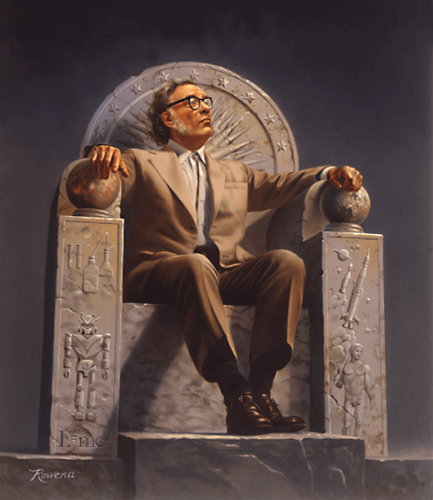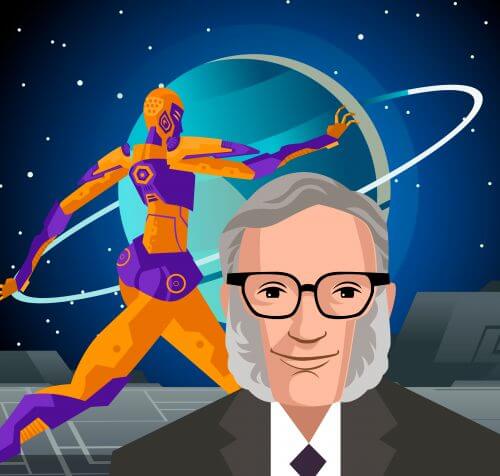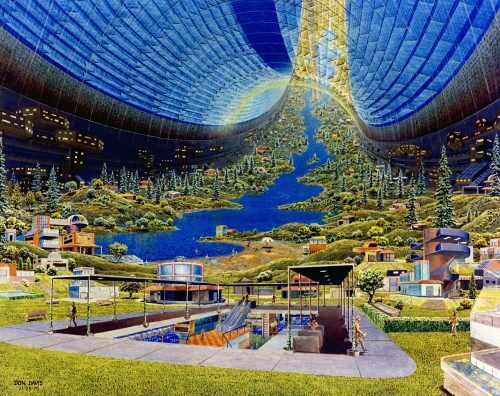Today, January 2, 2020, we mark the centenary of the birth of science fiction writer and scientist Isaac Asimov. Coincidentally or not, in 1983 he published an article about what would happen just before his hundredth birthday - the year 2019

At the end of 1983, The Toronto Star asked Perhaps the most famous science fiction author, Isaac Asimov, predicts how the world will look in 2019. The reason for choosing 2019 was the time period - 35 years, which is the same period of time that passed between the writing of the book 1984 by George Orwell and the year itself. Asimov's thought exercise highlights how difficult it is to predict the future of technology.
Isaac Asimov was one of the most famous science fiction writers in the world, who wrote or edited more than 500 books in a career spanning four decades. The Russian-born Jewish writer published hard science fiction stories such as I am a Robot, Sunset, and the Mossad series. Naturally, his work contained many predictions about the future of society and technology.
Stephen Johnson notes that some of these predictions have come true, such as our ability to use what he calls sound and contract communication to contact anyone on Earth. But other predictions such as a machine that can convert yeast, algae and water into foods such as meatless turkey have not yet come true (although labs are trying to develop artificial meat from stem cells, and already today there are pretty good plant-based meat substitutes, but not yeast and algae).
With a certain reservation, Asimov wrote that he predicts the future of society given that a nuclear war did not occur between the USA and the Soviet Union. This of course did not happen. The Soviet Union also disintegrated, although today's Russia pretty much inherits it in many respects, but the nuclear threat is not visible on the horizon despite withdrawals here and there from the nuclear disarmament agreements. Today, the main enemies are North Korea, which already has nuclear weapons, and Iran, which is playing cat and mouse with the inspectors of the International Atomic Energy Agency. After this reservation, he predicted two issues - computerization and the utilization of space.
Computing and robotics

- "Computing will inevitably continue to advance."
- "Computing will penetrate every home and the increasing complexity of society will make life without this technology impossible.
- Computers will disrupt work habits and replace old jobs with radically different ones.
- Robotics will eliminate "routine jobs."
- Society, and in particular the education system, will have to undergo a change, and entire populations must become computer literate and face the high-tech world.
- The educational transition will be difficult for many, especially when the world's population is growing at unprecedented rates.
Asimov still rarely appreciated the real impact that computer computing with complicated communication sockets had in practice in the XNUMXs, where are the cell phones. Asimov estimated that there would be resistance to the progress of computing, but it would be a Luddite demonstration that would not stop the advance. Before the agricultural revolution, the vast majority of humanity engaged in agriculture and professions indirectly related to it. After industrialization the transition from farm to factory was quick and painful. In the computing revolution, the revolution from the factory to its equivalent in the information age is even faster and even more painful.
Zhang points out that some attribute to automation the source of the economic problems the US is suffering from - the formation of the rust belt - where the industrial steel belt used to be, the collapse of mining towns, the stagnation of wages - all of these are part of the pain.
Asimov also writes that: "It's not that computing is going to provide fewer jobs in general. Technological advancement has always created more jobs than it destroyed and there is no reason to think that this will not be true now.
Again, Asimov is absolutely right about the economy. The idea that automation will take the jobs was already a centuries-old cliché when Asimov wrote these words, and which has proven itself time and time again. Apparently, unemployment has not increased in the last thirty years and neither will artificial intelligence, according to the author of the article, cause us all to be unemployed in the next thirty years.
Asimov also wrote that the jobs that will appear will involve the design, manufacture, installation, maintenance and repair of computers and robots, and the formation of entirely new industries that the smart machines will enable. Zhang says this statement is correct only to a certain extent. Most production tasks have been replaced by service jobs, not high-tech jobs that require advanced education.
Another interesting prophecy of Asimov's that came true was: Schools will undoubtedly still exist, but a teacher will be considered good if he arouses the curiosity of the students who will enrich themselves with his terminal and computer socket. In the end there will be an opportunity for every young person, indeed, every person, to learn what they want to learn. In his own time, at his own speed, in his own way, in his own way."
However, Zhang points out that indeed the knowledge that comes mostly from the Internet is broad but shallow. Most of the young people have all the human knowledge at their fingertips but even so they need formal studies to understand the issues in depth.
Asimov also noted that in the future we will have more free time that we can use forscientific research. In literature and the arts, to pursue fascinating hobbies of all kinds. Of course, he did not anticipate the impact of social networks, which allow everyone to live in their own bubble with people who agree with their opinions, no matter how far-fetched, and that more time is spent playing computer games than scientific research.
Utilization of space

"We are going back to space to stay," he was quite right, the International Space Station has been continuously manned for more than 18 years. But we haven't gone back to the moon yet and we certainly haven't started mining its minerals, and there is no solar power plant in orbit around the Earth that sends its energy in microwaves to turn it into electricity on Earth. Also the first space colony that Asimov expected to be at least on the drawing boards and maybe actually built - something that didn't happen. The suborbital flights promised by companies such as Virgin Galactic and Blue Origin are also stuck in the testing stages due to disasters.
But he was optimistic about progress in the field of space and predicted that humans would return to the moon on a large scale with mining operations and factories that use the special properties of space, observatories and more.
"By 2019, the first settlement in space will be on the planning boards, and possibly in actual construction, he wrote. "This will be the first of many colonies that can accommodate tens of thousands of residents and where it will be possible to create societies of all kinds, and bring about another turning point for humanity."
In the meantime, NASA's plans talk about sending individual astronauts to the moon (a man and a woman), but from here to permanent human settlement on our natural satellite, the road is long.

7 תגובות
Eli Ben David
I agree with you!
Indeed, the translation is somewhat careless. Asimov did not predict many things and the 'predictions' he was asked for were not close to the predictions seen in the 'Back to the Future' series of films. seem somewhat innocent. What if someone who is not well versed in physics and technological developments but has nothing to complain about. Back in the day, all the 'experts' claimed that an average home computer didn't need more than 150 MB of disk space, not to mention memory space, and today? But there is no doubt - Asimov is one of the greatest writers of the Arab world. I disagree that he was the greatest of the writers of the Madev because in my opinion Stanislav Lem was the greatest of them all, but that's just my opinion
Asimov was a giant in his field, but it's funny that the computers he describes in the future are still card-fed
A shameful translation that disrespects the readers.
A minimal lack of respect for the subject, the object of the article and the readers who are forced to read a bad text that was probably translated using Google with failed editing.
Besides being a scientist and a contract, Asimov was also an excellent writer. Most of his books are interesting and fascinating and the heroes of his stories are unique and unusual characters such as Harry Seldon from the Mossad series or Susan Calvin from the Robot series.
His best book, in my opinion, is Institution and Imperialism, in which he masterfully builds the relationship between Beita Radel and Magnifico, the mule's pitiable mook, who finally turns out to be actually the mule himself, the ruler of the galaxy.
The other institution calls for a rebellion - against the mule.
"Today the main enemy in this field is Iran"?! Since when do they have nuclear weapons?
Wow compared to many predictions he is very accurate. Although he is also too optimistic.
In the next decade we will probably see a significant slowdown in technological progress and perhaps even in other issues (much of the progress to date has been led by technological progress)